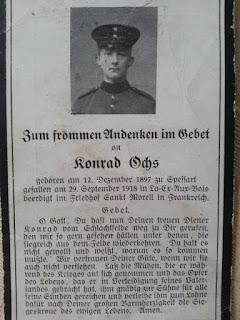The Battle of Verdun, a German offensive known as "Unternehmen Gericht", commenced on February 21, 1916 and was one of the largest battles of the First World War at the Western Front. The battle continued until December 18, 1916 and was fought on the hills north of Verdun-sur-Meuse in north-eastern France.
 |
| German Military Map of Verdun, 1916 |

The original idea for the attack at Verdun came from Crown Prince Wilhelm, the Supreme Commander of the 5th Army and Konstantin Schmidt von Knobelsdorf, the Chief of General Staff of the 5th Army. The 5th Army attacked the Région Fortifiée de Verdun (RFV) and the Second Army garrisons, as they intended to capture the Côtes de Meuse from which Verdun could be bombarded with artillery. Verdun was originally the strongest fort in France, and Germany's intention in attacking it was to once again strengthen its position on the Western Front. Germany assumed that the French would attempt to hold the eastern bank of the Meuse, and thus suffer catastrophic losses from German artillery fire.
The Germans made important gains at the start of the battle but the French were able to recapture much of the lost territory towards the end of the year, despite the English offensive at the Somme in July.
Report from Ettlingen's newspaper the "Badischer Landsmann", March 1, 1916.
The Battles at the Western Front. Attack at Verdun.
The town of Verdun under German fire.
Bern, March 1. (Not official). The "Petit Parisien" reports that numerous villages in the vicinity of Verdun have been cleared; the inhabitants are leaving the town of Verdun in droves and arrive in Paris in fearful expectation of news. The town has suffered heavily. In their basements, the inhabitants had the impression that they were living in a continuous rain of iron and fire hailing down on Verdun and its vicinity. The people had to be forced to leave the town on several occasions. Currently, the town has been completely cleared, apart from a dozen or so inhabitants and a few officials.
On February 25, Fort Douaumont was conquered by German troops, which caused the French to decide that the fort of Verdun must be held at all costs. General Pétain was entrusted with the defense of the town of Verdun. He introduced the "Noria", a system of rotation ensuring that French soldiers were relieved after short periods of time.
The battle consisted of four phases: the first ended on March 4, as French artillery stopped German advancement from the heights west of the Maas. In the second phase, Erich von Falkenhayn, the German Chief of General Staff, ordered attacks on the heights. The height "Dead Man's Hill" was taken several times, but never held for long. In the third phase, the focus was on taking Verdun itself. The storming of Fort Vaux commenced on June 2, and an attack on the Vaux-Fleury line with 78,000 men started on June 21. German troops were able to advance in a fourth phase, with heavy battles at Fort Thiaumont (south of Douaumont). The German attack ultimately stalled at Fort de Souville (5 km northeast of Verdun), and in view of the Allied attack at the Somme on July 1, Falkenhayn halted the offensive on July 11.
Destroyed French village at the Western Front
The "Badischer Landsmann" of February 28, 1916 published the following report from February 27:
To the west of the fort, our troops have now taken Champneuville, the Côte de Talon and are advancing towards the southern border of the forest to the northeast of Bras.
To the east of the fort, they are storming the extensive fortifications of Hardaumont.
In the Woevre plain, the German front is advancing in battle quickly towards the foot of the Côtes de Lorraine.
According to current reports, the number of non-injured prisoners is now almost 15,000.






























.jpg)
.jpg)

.jpg)
.jpg)
.jpg)
.jpg)
.jpg)
.jpg)
.jpg)
.jpg)
.jpg)
.jpg)
.jpg)
.jpg)

.jpg)
.jpg)
.jpg)
.jpg)
.jpg)